Xbira 250mg Abiraterone Acetate Tablets
$720.00 – $1,800.00Price range: $720.00 through $1,800.00
Xbira 250 is used to treat prostate cancer. It contains Abiraterone Acetate, which works by reducing the production of testosterone, a hormone that can promote the growth of prostate cancer cells.
| Pack Size | Price | Price / Unit | Quantity | |
|---|---|---|---|---|
| 120 Tablets | $720.00 | $6.00/ unit | ||
| 240 Tablets | $1,320.00 | $5.50/ unit | ||
| 360 Tablets | $1,800.00 | $5.00/ unit |
Looking for bulk / B2B pricing? | Send Inquiry |

| SKU | 11100 |
| Manufacturer | Cipla Limited |
| Categories | Anti Cancer |
| Delivery Time | 10 - 14 Working Days |
| Strength | 250mg |
Introduction to Xbira 250mg Tablets
Xbira 250mg tablets contain abiraterone acetate, a medication used primarily in the treatment of prostate cancer. It works by inhibiting the production of androgens (male hormones), such as testosterone, which fuel the growth of prostate cancer cells. Xbira is commonly prescribed for metastatic castration-resistant prostate cancer (mCRPC) in combination with other therapies, including corticosteroids like prednisone.
This medication targets the enzyme CYP17A1, which plays a crucial role in the production of androgens in the adrenal glands, testes, and prostate tumor tissue. By blocking this enzyme, Xbira lowers androgen levels in the body, thus slowing down the growth and spread of prostate cancer.
Xbira 250mg is usually taken orally, once a day, and it should be used under a healthcare professional’s supervision. The dosage may vary depending on the patient’s condition, and it is important to follow the prescribed instructions carefully. Additionally, corticosteroid therapy is often necessary alongside Xbira to prevent side effects associated with hormone suppression.
Uses of Xbira 250 mg
Xbira 250 mg is used in the treatment of:
- Prostate Cancer
- Metastatic Castration-Resistant Prostate Cancer
- Hormone-Sensitive Prostate Cancer
How Does Xbira 250 Works?
Xbira 250 mg has an active Anti Cancer ingredient; Abiraterone Acetate which belongs to a class of drugs known as antiandrogens. It basically stops the body from making testosterone which can slow the growth of Prostate Cancer.
Xbira 250 mg contains the active ingredient abiraterone acetate, which is used in the treatment of advanced prostate cancer. Abiraterone acetate is a type of medication known as a CYP17 inhibitor, and it works by targeting the production of androgens (male hormones) in the body, specifically within the adrenal glands and the tumor itself.
Side Effects of Xbira 250
Common Side Effects
- Fatigue or weakness
- Joint and muscle pain
- Nausea or vomiting
- Diarrhea or constipation
- Hot flashes
- Fluid retention (swelling in the legs or feet)
- Abnormal liver function tests
- Urinary tract infections
- Cough
- Indigestion or heartburn
Serious Side Effects
- Fluid Retention and Swelling
- Liver Problems
- Adrenal Insufficiency
- Heart Problems
- Low Potassium Levels (Hypokalemia)
- Allergic Reactions
- Adverse Cardiac Events
- Interstitial Lung Disease
Dosage of Xbira 250 mg
Xbira 250 mg contains an active ingredient, Abiraterone Acetate, which is used in the treatment of Prostate Cancer. Xbira 250 mg is available in various strengths and substitutes and should be given on prescription only. You should always consult your doctor for the duration of dosage as the age and severity of the disease differ from person to person.
Adults are advised to take Xbira 250 mg at a fixed time empty stomach (1 hrs prior or 2 hrs after the meal) preferably after food. Do not consume larger or smaller amounts than Prescribed. It is not recommended for Pediatric Population and Females. Couples should take effective contraception methods while they are on Xbira 250 mg therapy.
How To Manage Side Effects?
- Communicate with your healthcare provider
- Follow the prescribed dosage and schedule
- Take on an empty stomach
- Stay hydrated
- Manage bone pain
- Monitor for signs of liver problems
- Address high blood pressure
- Adrenal insufficiency precautions
Warning & Precautions
1. Electrolyte Imbalances:
- Xbira can cause low potassium or low sodium levels, increasing the risk of cardiovascular issues. Regular blood tests are needed to check electrolyte levels.
2. Corticosteroid Use:
- Xbira is often used with corticosteroids like prednisone to manage side effects. Excessive corticosteroid use can lead to complications like adrenal insufficiency or Cushing’s syndrome, so proper monitoring is required.
3. Pregnancy & Breastfeeding:
- Xbira can harm an unborn baby and should not be used by women who are pregnant or breastfeeding. Women should avoid pregnancy during treatment, and appropriate contraception should be used.
4. Bone Health:
- Long-term use of Xbira may impact bone health, potentially leading to bone fractures. Monitoring for bone mineral density may be necessary, especially in patients at risk for osteoporosis.
5. Adrenal Insufficiency:
- The medication can reduce the function of the adrenal glands. Symptoms like fatigue, nausea, and weakness should be reported to a healthcare provider promptly.
6. Risk of Infections:
- Xbira may weaken the immune system, increasing the risk of infections. Patients should report signs of infection, such as fever or chills.
7. Drug Interactions:
- Inform your doctor of any other medications you’re taking, as Xbira can interact with certain drugs, especially those that affect liver enzymes.
Safety Advice
- Monitor liver function with regular blood tests.
- Check blood pressure regularly for hypertension management.
- Use corticosteroids as prescribed alongside Xbira.
- Monitor electrolytes to prevent imbalances and complications.
- Report any heart symptoms, including chest pain.
- Ensure bone health with regular monitoring.
- Watch for signs of infection, report promptly.
- Inform doctor of all other medications taken.
Frequently Asked Questions
1. Can Xbira 250mg Tablet cure prostate cancer?
Xbira Tablet does not cure cancer but helps in prolonging and improving the life of the patient. Moreover, when prostate cancer is treated with Xbira Tablet then the frequency of fractures is relatively less. Similarly, the increase in pain is less common with Xbira Tablet.
2. Is Xbira 250mg Tablet a chemotherapy drug?
Xbira Tablet is a hormonal treatment not a chemotherapy drug. It is used to treat prostate cancer in adult men that has spread to other parts of the body. Xbira Tablet stops your body from making testosterone. This can slow down the growth of prostate cancer.
3. Why do I need to take prednisolone with Xbira 250mg Tablet?
Your doctor will always prescribe prednisolone with Xbira Tablet. Taking these two medicines together lowers the risk of getting high blood pressure, fluid retention (having too much water in your body), or having reduced levels of potassium in your blood, which can occur due to Xbira Tablet.
4. Does Xbira 250mg Tablet affect liver?
Xbira Tablet can cause severe liver problems. In very rare cases, Xbira 250mg Tablet may even cause failure of the liver to function (called acute liver failure), which can even lead to death. Tell your doctor if you experience yellowing of the skin or eyes, darkening of the urine, or severe nausea or vomiting, as these could be signs or symptoms of liver problems.
| Pack Size | 120 Tablets, 240 Tablets, 360 Tablets |
|---|---|
| Price/Unit | $5.00/unit, $5.50/unit, $6.00/unit |
Be the first to review “Xbira 250mg Abiraterone Acetate Tablets” Cancel reply
Related Products
No related Products Found

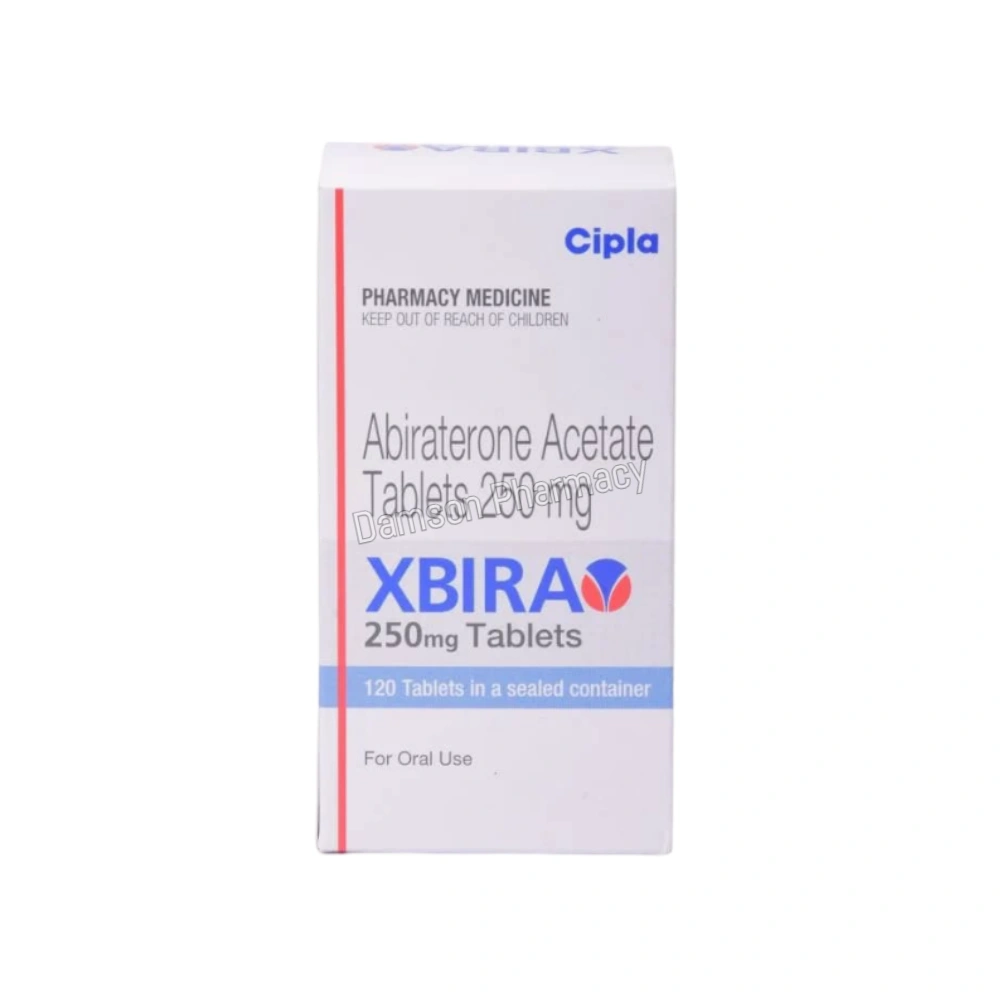
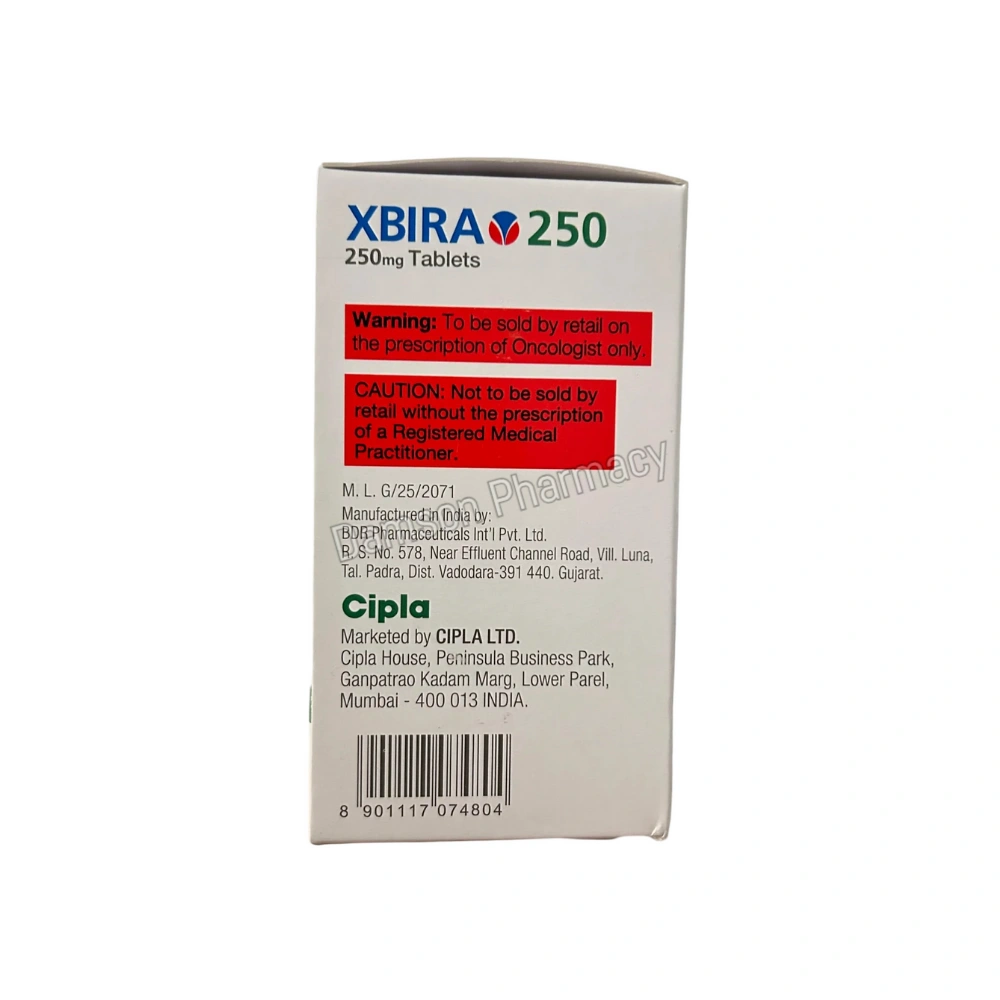
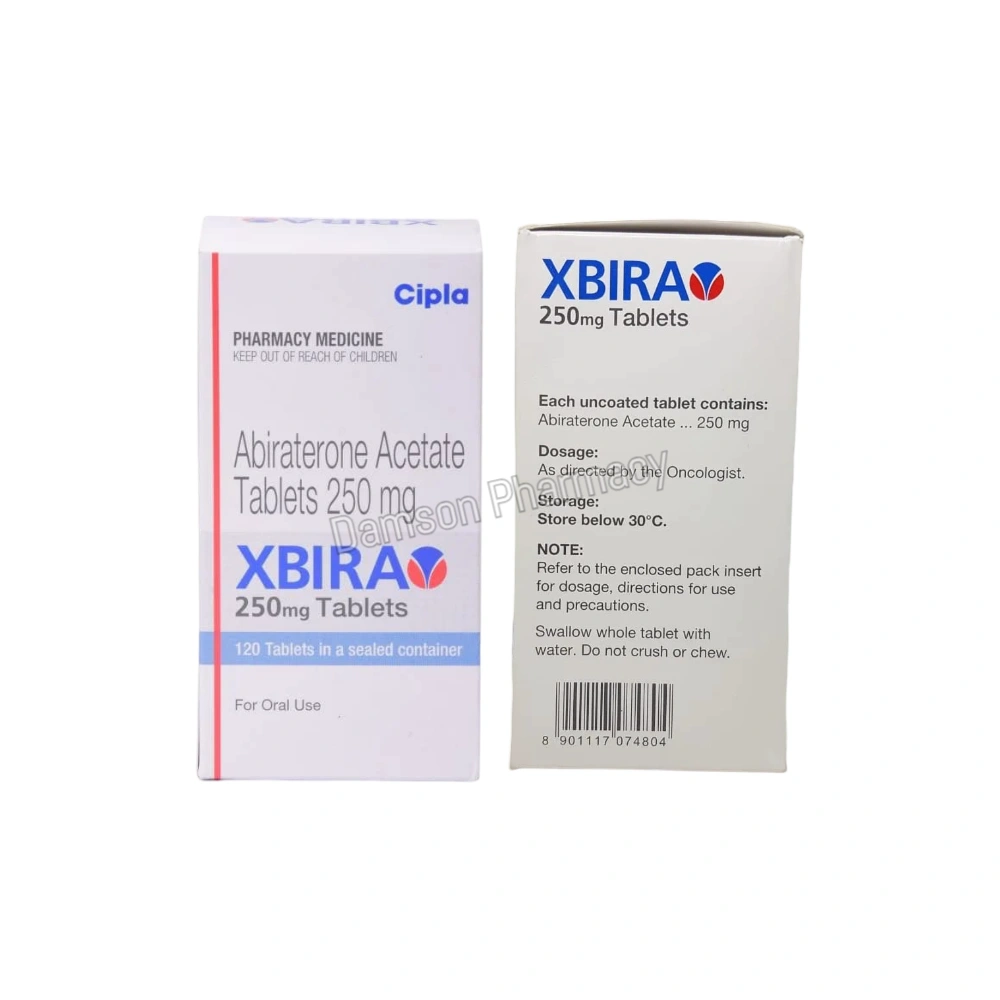
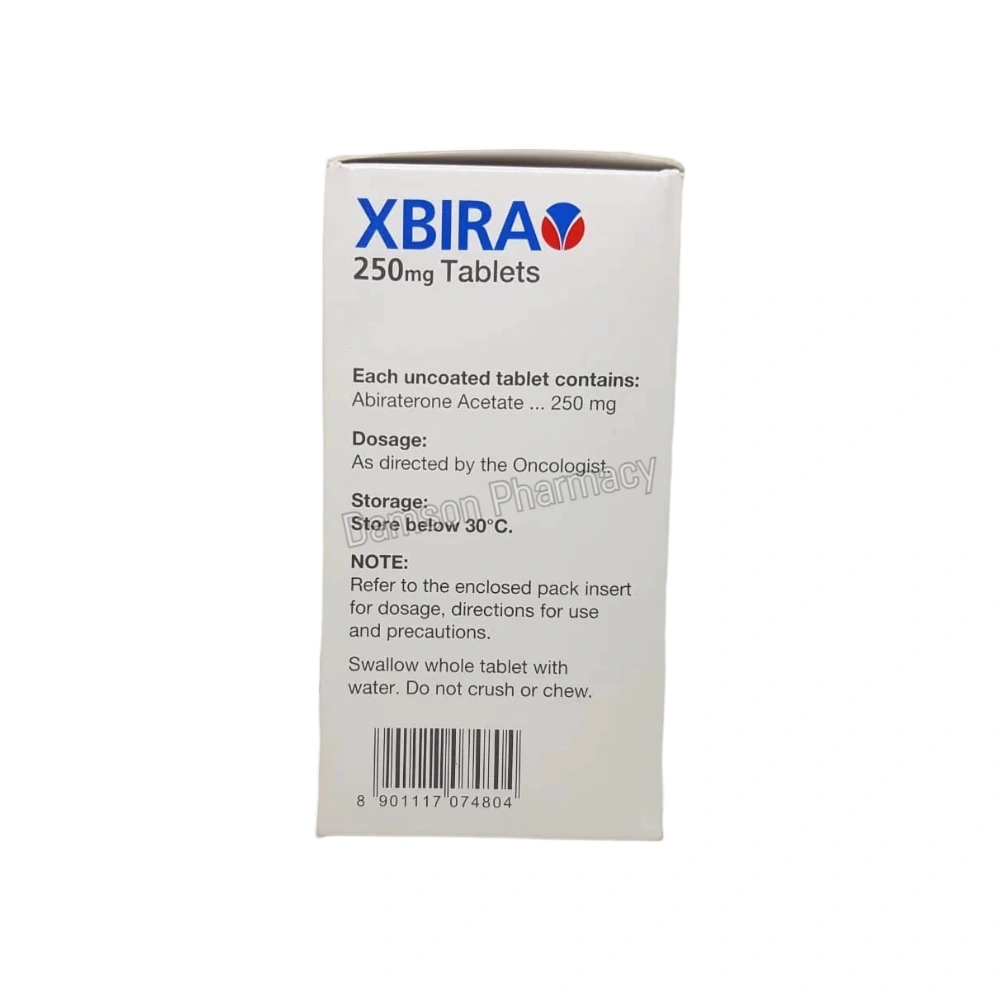
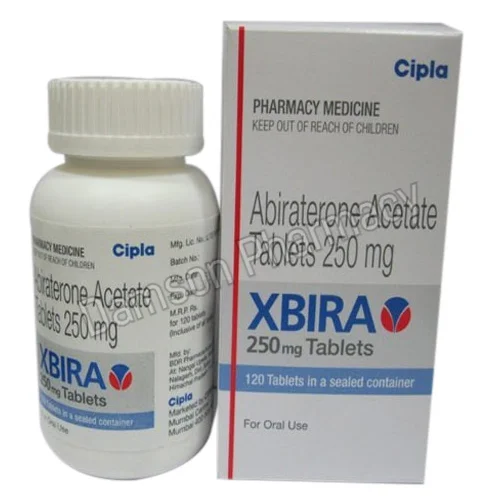
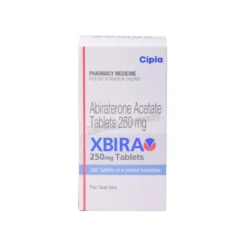



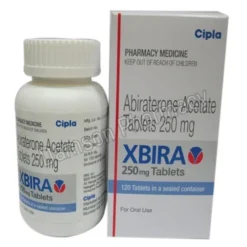
Reviews
There are no reviews yet.